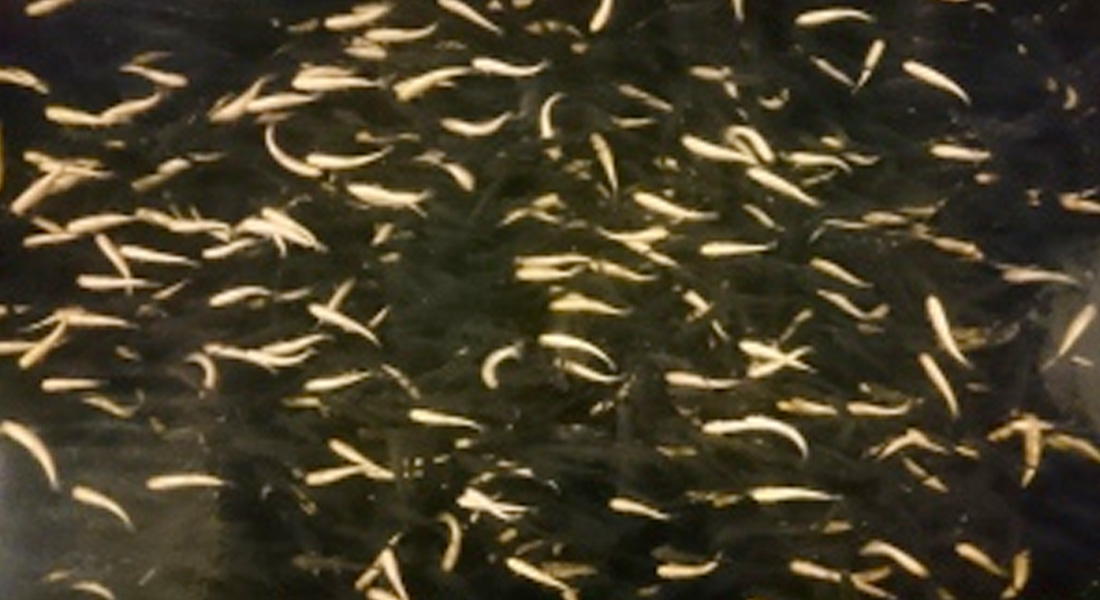Bacteriophage based technology for pathogen control in aquaculture

Our objective is to improve the sustainability, food safety, and productivity of aquaculture in the Baltic Sea region by developing environmentally balanced bacteriophage-based strategies to control the important Flavobacterium pathogens.
Globally, aquaculture is the fastest growing animal production industry (AGR: 8.8 %, FAO 2014), driven by an increasing demand for high quality protein and healthy food. In the Baltic Sea region, aquaculture growth is constrained by concerns about environmental impacts. To realize the full potential of the industry in the region, environmentally sustainable technologies must be developed and applied across the various stages of the aquaculture rearing cycle.
Rearing fish in high densities promotes invasion and transmission of pathogens leading to disease outbreaks and reduced survival at the fry stage in particular, causing substantial economic losses to the industry. For fish in marine or brackish aquaculture, vaccines are quite effective against the pathogens they encounter, but for fry stages facing the Flavobacterium pathogens found in freshwater aquaculture, vaccines do not work. Currently these pathogens are controlled with antibiotics but this strategy is flawed with serious concerns about development of bacterial antibiotic resistance as well as its potential transfer to human pathogenic bacteria. Our novel idea for disease management uses natural microbial 'warfare' that is both sustainable and environment-friendly: bacteriophages.
Keywords
Phage therapy, pathogen control, aquaculture
Partners
Denmark, Finland, Poland
University of Copenhagen, Denmark
Professor Mathias Middelboe
Post doc Daniel Elías Castillo Bermúdez (daniel.castillo@bio.ku.dk)
PhD student Jóhanna Jørgensen (johannajorgensen88@gmail.com)
Ms student Liv Dramshøj
Ms student Natasja Jørgensen
Ms student Susie Madsen
Ms student Alexander Højsting
Accountant Helle Kovaltsenko (hskovaltsenko@bio.ku.dk)
University of Jyväskylä, Finland
Associate Professor Lotta-Riina Sundberg
Post doc Heidi Kunttu (heidi.m.t.kunttu@jyu.fi)
PhD student Anniina Runtuvuori (anniina.runtuvuori@jyu.fi)
Technical University of Denmark, Denmark
Associate professor Inger Dalsgaard
Senior researcher Lone Madsen
PhD student Valentina Donati
Åbo Akademi University, Finland
Senior lecturer Tom Wiklund
Post doc Krister Sundell (ksundell@abo.fi)
Phage Consultants, Poland
Article in the Danish newspaper "Helsingør Dagblad", May 2017
https://helsingordagblad.dk/artikel/mathias-har-f%C3%A5et-17-millioner-til-fiske-forskninghttps://www.nsnet.dk/2017/05/02/mathias-har-faaet-17-millioner-fiske-forskning/
Description of the project in the October 2017 issue of BONUS in Brief
https://www.bonusportal.org/
Publication in Frontiers in Mircobiology, July 2019: Phenotypic and Genetic Predictors of Pathogenicity and Virulence in Flavobacterium psychrophilum
https://www.frontiersin.org/articles/10.3389/fmicb.2019.01711/full
Funded by
Total budget: EUR 2.2 million
Period: 1.4.2017-31.10.2020
Project coordinator:
Professor Mathias Middelboe
Contact
Professor Mathias Middelboe
Marine Biological Section
Strandpromenaden 5
DK-3000 Helsingør
mmiddelboe@bio.ku.dk
Phone: +45 35 32 19 91

